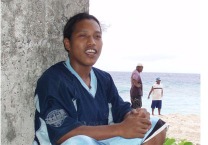 Jefferson Jibas, 20, loves living on a tiny Pacific island where he doesn’t have to work and everything he needs is free. His older brother, Anderson, is frustrated with lack of opportunity on the island and plans to return to college.
Jefferson Jibas, 20, loves living on a tiny Pacific island where he doesn’t have to work and everything he needs is free. His older brother, Anderson, is frustrated with lack of opportunity on the island and plans to return to college.
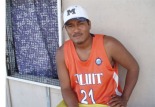
Within this family is the dynamic of some 1,100 displaced souls still living on a rock surrounded by open ocean. The original 167 Bikinians were moved off Bikini Atoll in 1946 so the United States could test nuclear bombs. They’ve lived off of rations for so long on Kili that most don’t know the traditional ways of living. Modern skills, such as mechanics and computers, haven’t been learned. Many are caught between the two worlds and work in neither.
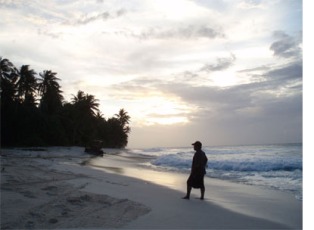
Today they could go back to Bikini but food would have to be imported as cesium from nuclear fallout still contaminates plants on Bikini. The local government chooses to live off the proceeds of their trust funds instead of ridding Bikini of the “poison,” as they call radiation.
Kili is a dot on a map in the Pacific Ocean 2,500 miles west of Hawaii. It has about a third of a square mile in surface area and no one can stroll for more than 20 minutes in any direction. There are only a few government jobs and food is USDA rations.
Jefferson attended school in the United States for seven years but didn’t earn his high school diploma. Now he just likes to play basketball. Anderson Jibas, received his high school diploma in the United States and finished one year of college while working full time. He plans to attend College of the Marshall Islands next semester in Majuro, the capital of the Republic of the Marshall Islands.

Kili offers day-to-day subsistence and little else. Unlike Bikini it has no lagoon and fishing is difficult much of the time. Young people face a quandary – live a simple lifestyle from compensation funds, or leave the island for better education. Citizens of the Republic of the Marshall Islands can live, work and attend school in the United States. Social services available to Americans are also open to them, such as Pell grants. But most Bikinians on Kili have never attended any type of school.
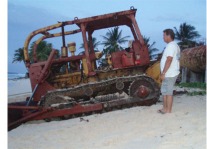 They’ve been both “screwed” and “spoiled” by the U.S. government, said Mark Townley, director of Bikini Projects Department (BPD) which manages infrastructure on Kili. He’s a ri-belli, the Marshallese term for “American,” or “foreigner.” Most of his 27 employees are originally from other islands where they received job training before marrying into the Bikinian community and living on Kili, which offers no such education.
They’ve been both “screwed” and “spoiled” by the U.S. government, said Mark Townley, director of Bikini Projects Department (BPD) which manages infrastructure on Kili. He’s a ri-belli, the Marshallese term for “American,” or “foreigner.” Most of his 27 employees are originally from other islands where they received job training before marrying into the Bikinian community and living on Kili, which offers no such education.
The only education on Kili is the elementary school, understaffed and undersupplied. While Jefferson would rather play basketball, Anderson would rather help educate the island. But after teaching at Kili elementary school for eight months he wasn’t being paid by the Bikini local government and quit.
“That happens all the time,” he said standing in front of his house in January. “They [the Bikini government] say education is their first priority. How can it be? Just look at the Bikini budget.”
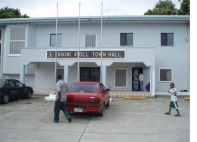
Though the Bikini government, running on a $9.4 million budget, spends $2 million every year on education for its students in the Marshall Islands and the U.S., the overall budget is not public record and a request for a review was turned down at the Bikini Atoll Town Hall in Majuro.
Outside the Jibas house on Kili was a short palm tree with several of the fronds and the stem clipped. A bottle was suspended from one and caught the slow dripping nectar while Anderson monitored. “It’s ‘Jakaro,’” he said. It’s what he does all day, waiting for a bottle to fill so he can share with his family and friends. “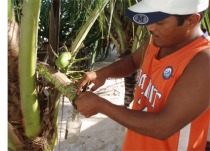 I have to do something. It keeps me educated. That’s what I do every day. There’s nothing else to do here,” he said with his arms out and palms up, indicating the entire island.
I have to do something. It keeps me educated. That’s what I do every day. There’s nothing else to do here,” he said with his arms out and palms up, indicating the entire island.
He brought out some in a glass with ice. It’s a sweet drink – like a kiwi strawberry Snapple with subdued sweetness and flavor. All natural.
There are three main sandy roads on Kili – one down the middle and one on each side. On one end of the narrow island the palm trees grow thick and at the other end are many of the island’s houses together near the church, cemetery, playing field and school. There  are 110 houses on Kili, mostly made of sturdy cinderblock and have running water, which is upscale by Marshallese standards. Nearly every house has air-conditioning and a TV. A kid showed his video rental for that night – “Getting Even With Dad.”
are 110 houses on Kili, mostly made of sturdy cinderblock and have running water, which is upscale by Marshallese standards. Nearly every house has air-conditioning and a TV. A kid showed his video rental for that night – “Getting Even With Dad.”
In responding to what people do on Kili, one resident said, “sleep, watch TV, air-conditioning.” Possibly the only place in the world where air-conditioning is a verb.
“We cannot do anything on this island,” said another resident, Urantha Jibas, father of Anderson and Jefferson, as he sat on a bench outside his house. “How does your government feel about brining and putting us on a reef for 60 years?
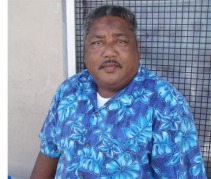
“There are people scattered around the Marshall Islands who still have their old ways, traditions, customs. How come the U.S. government isn’t finding a way to teach our old ways? Why don’t Americans teach the elders to be more educated in this modern life?”
Urantha Jibas is the only one of 12 Bikini council members representing Kili who actually lives on Kili. He said the other leaders living on Majuro don’t “feel the heat” or live like exiles,” like the rest of Kili residents.
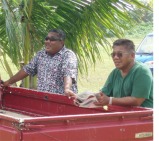 This upsets Johnny Johnson, 56, who ran for Bikini mayor on the promise he would establish the mayor’s office on Kili. He lost in a close, heated election to Eldon Note.
This upsets Johnny Johnson, 56, who ran for Bikini mayor on the promise he would establish the mayor’s office on Kili. He lost in a close, heated election to Eldon Note.
“We have [Jack Niedenthal, the Bikini Trust liaison] there [in Majuro]. He can handle what needs to be done,” said Johnson. “No meeting has taken place here since last year, no council meeting. Why? What is the mayor doing in Majuro?”
Note, the mayor, said the Bikini government may go back to U.S. claims court this spring if Congress hasn’t responded to a nearly six-year old request for additional compensation to be given to the RMI. He and Niedenthal work through a lawyer in Washington, D.C. There are no phones or e-mail on Kili. After an interview in his office, Note did not respond to a follow-up question by e-mail regarding the Bikinians’ use of their trust funds.
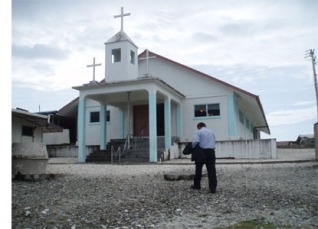 Twenty years ago Johnson resigned from the second highest position in the Bikini government as treasurer and took his family to Minnesota to attend Bible college. He now serves as head deacon at one of two churches on the island.
Twenty years ago Johnson resigned from the second highest position in the Bikini government as treasurer and took his family to Minnesota to attend Bible college. He now serves as head deacon at one of two churches on the island.
“I feel like I have a burden helping my people understand the stress of being here for over 50 years,” said Johnson at a picnic table while others came to watch him talk with a visiting reporter. The visitor asked what the half-dozen men sitting down under a tree 40 yards away were doing. “They are talking story – telling of the old way,” Johnson said. Some people around the table smirked. “They are thinking deeply,” he said and everyone laughed.
“They were probably talking about women,” one resident said.
Later on a bench on his porch Johnson said it was “embarrassing” living on Kili. “Because this is it. They have no other place to go. As long as they are on the island they’re ashamed to be begging of the U.S. government.”
Like many Bikinians, he’s not bitter that the U.S. conducted tests at Bikini. He’s glad that better technology came from nuclear tests. But the U.S. still has to fulfill its obligation of returning them home, he said.
 He showed the inside of his house and criticized nearly everything. “I blame the U.S.” he said pointing to some minor repairs needed in the kitchen under the sink cabinetry. It was hard to tell whether he was kidding. He complained that he needed a chair to keep the oven door closed – as if thousands of Americans don’t do the same. His refrigerator, where he keeps his USDA supplies and other food, didn’t produce enough frost he thought.
He showed the inside of his house and criticized nearly everything. “I blame the U.S.” he said pointing to some minor repairs needed in the kitchen under the sink cabinetry. It was hard to tell whether he was kidding. He complained that he needed a chair to keep the oven door closed – as if thousands of Americans don’t do the same. His refrigerator, where he keeps his USDA supplies and other food, didn’t produce enough frost he thought.
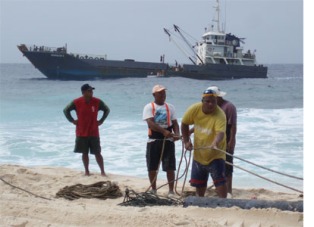 Supplies come four times a year from a charter ship that sails from Majuro. It takes about a week to unload the supplies – three or four days if the waves are smaller.
Supplies come four times a year from a charter ship that sails from Majuro. It takes about a week to unload the supplies – three or four days if the waves are smaller.
In mid-January, the ship sat offshore while Bikini Projects Department workers towed supplies on a 15- x 15-foot barge from a bulldozer on shore. Smaller items were unloaded on an aluminum boat with an outboard motor through waves crashing on the reef. A channel about 30 yards wide was cut out of the reef providing some protection. 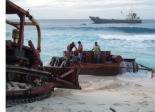 As the boat bounced on waves to shore, two men ran out to grab it and turn it around to face the next wave so it could bob up and down instead of drifting sideways where it might have flipped in the instant of a curl.
As the boat bounced on waves to shore, two men ran out to grab it and turn it around to face the next wave so it could bob up and down instead of drifting sideways where it might have flipped in the instant of a curl.
“They need a dock. This is dangerous,” said Townley, the BPD supervisor. “A man lost his life yesterday.”
The day before, Friday, Jan. 13, Lamdrik Aneo drowned after jumping out of the aluminum boat to swim ashore. His body was found with scratches on his forehead, according to the police chief, suggesting the undertow slammed him against the reef.
On Saturday afternoon a policeman came to the channel where BPD workers were still unloading supplies and asked to borrow Townley’s pickup truck (there are a dozen 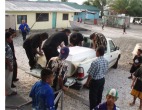 or two vehicles on the 200-acre island). The funeral at the church was over, and he wanted to move the casket from the church to the cemetery.
or two vehicles on the 200-acre island). The funeral at the church was over, and he wanted to move the casket from the church to the cemetery.
At church the widow and daughter wore black dresses, unlike the colorful muumuus most women on the island wear. The closed  casket was painted white and sat in front of the church between two pews for the family placed perpendicular to the audience.
casket was painted white and sat in front of the church between two pews for the family placed perpendicular to the audience.
Before the service ended, mourners placed money on the casket for the family, American currency as it is used in the Marshall Islands. Church and funerals are delivered in the Marshallese language. Out of respect, no one on the island would fish or play basketball for the next few days.
Several mourners gathered at the deceased’s house that evening. The widow and her family provided visitors with food. Some took home a plate of chicken. Up the road in the dark three young men stood drinking coffee (the island is officially dry) and asked for a lighter. What do they do on an average Saturday night?
“Nothing,” they said.
Nothing also keeps happening regarding the restoration of Bikini. Cleaning Bikini Atoll well enough for resettlement would cost about $250 million. It would involve scraping off topsoil and fertilizing the atoll with potassium, a nutrient plants prefer over the similar cesium left from fallout.
The Bikini government now has about $150 million in trust funds for resettlement. They use the proceeds of this investment for their $9 million annual budget, including an approximate $200 check for every Bikinian. Other nuclear affected atolls, such as Enewetak and Rongelap, have begun resettlement. Bikinians feel if they start to resettle, the U.S. will dust its hands of the problem and consider it over. Bikini government officials who are willing to answer the question of resettlement say their current funds are “not enough.”
Bikinians brought suit against the U.S. in 1974 requesting an environmental survey, which came after they moved off the atoll a second time. In 1978 the U.S. awarded them the $6 million “Hawaiian Trust Fund for the People of Bikini.” In 1982 they received $20 million with the “Resettlement Trust Fund for the People of Bikini.” With this $20 million they were about to move to Maui en masse, but locals there said they weren’t welcome, citing difficulties with Pacific islanders from other nations. The U.S. later added $90 million to the resettlement trust.
The Republic of the Marshall Islands entered into the Compact of Free Association with the United States in 1986. The compact pledged $150 million for the establishment of an independent Nuclear Claims Tribunal to the RMI and $75 million for Bikini. With the compact the United States also defends the republic and provides additional funding for health and education infrastructure. The compact was renegotiated in 2004 and runs through 2023.
In March 2001, the independent Nuclear Claims Tribunal established by the original compact awarded Bikini $563 million, half for cleanup and half for loss of use and suffering and hardship – with no money to back it up.
The original compact included a provision for the petitioning of Congress if scientific research provided new understanding that wasn’t available at the time of the compact.
On Sept. 11, 2000, the RMI submitted a petition to Congress for an additional $3.3 billion. Congress passed it off to the State Department for analysis, which requested other agencies’ legal examination. It was determined there were no “changed circumstances.” The State Department’s response was returned to Congress Jan. 3, 2004. Congress still hasn’t responded.

The Bikinians took their $563 million claim to the U.S. Court of Federal Claims April 11. Mayor Eldon Note wanted it to be a “last resort,” but Congress still hasn’t responded to the change of circumstances petition.
“Bikinians feel what the U.S. government gave them is not enough for using their homeland,” Note said. “They still need an answer.”
“There have been promises ever since 1946, but this hasn’t been done yet,” said Tomaki Juda, Bikini senator to the RMI Nitijelã, or legislature, in a short interview in his capitol office. “This is what we’re still waiting for.”
Some think the U.S. got off easy and that the RMI was eager to ride on the coattails of nuclear victims. Bikinians and others from the northern and most-affected atolls were against the compact.
Bill Graham, Public Advocate for the Nuclear Claims Tribunal, thought the compact was a way for the U.S. to get rid of liability for its nuclear tests. “It’s like waving a T-bone steak in front of a starving man,” Graham said in his office on Majuro in early January. “There were hundreds of millions of dollars in pending suits against the U.S.”

But he conceded that the U.S. had at least done something, unlike other countries that conducted similar tests, including the United Kingdom, France, Soviet Union and China.
“I think it’s good that the United States recognized its liability and sought to settle claims that were being pursued in U.S. courts,” he said. “That’s something that, clearly, no other country on this planet has done. And there have been other countries that engaged in nuclear testing that had effects on peoples in those countries, and to my knowledge still virtually nothing is being done.”
He admitted, though, that the RMI government hadn’t always kept the independence of the tribunal. Some laws were passed that dictated how the tribunal would honor claims from nuclear victims. This relaxed requirements for compensation. The tribunal’s original $150 million is now $2 million. Graham thought the tribunal would be out of business soon. “If this conversation were taking place a year from today, the movers would be taking the last boxes out of this office because at the end of 2006 we won’t exist anymore, I can’t imagine.”
Bikinian Alson Kelen said he wishes he could turn back the clock and have the U.S. provide education for Bikinians instead of money. A youth counselor at the jail in Majuro, he said lack of education has lead to an unwise use of money.
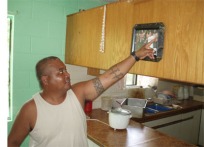
“When the U.S. gives us money we don’t know what to do with it,” said Kelen at his home on the island of Ejit, an island off Majuro Atoll, in January. “We don’t know how to take care of ourselves.”
No longer living off the land, many Marshallese suffer from diabetes and eat a diet of imported processed foods. Lolipops are a favorite, from kids handing them out to visitors to the senator sucking on them during the Nitijelã session.
Kelen runs a project building traditional canoes and has partially completed a doctorate in traditional navigation. “We don’t know how to weave mats, build canoes, build houses the old ways. These are the things we need to live [on Bikini],” he said.
“We were brought up in a society that was unique. We were given canned foods, we were spoiled. Most of us didn’t go to school. We’re all dropouts. Now we have kids.
“If I had to change the world it would be education for us in the ‘60s.”
“I’m sad to say there’s a great deal of ignorance here in the Marshall Islands,” said Graham, the tribunal claims advocate.
He tells of Bruce Piggott, former tribunal director, saying: “ ‘These people are ignorant.’ At the time I thought this was a huge insult.” Graham later heard the phrase, Ignorance is curable, stupidity is forever. “Mr. Piggott wasn’t saying they were stupid. … Mr. Piggott wanted to explain that they weren’t worldly, they lived sheltered lives … there are things such as handling money that they didn’t have experience with.
“I remember giving a woman a check for $40,000. She came back the next week saying, ‘I need some more.’ We were paying 40 percent as an initial payment on new awards at the time. She had a condition for which she was awarded $100,000 in compensation.” It was explained to her at a hearing that she would receive annual payments. She gave $2,000 to each of her kids and bought a pickup.
Most Bikinians still remain scattered throughout the Marshall Islands, about one third on Kili. Many feel helpless.
“Most of our health problems is from the radiation,” said one member of the Bikini counsel, his belly over his belt and fillings in his teeth.
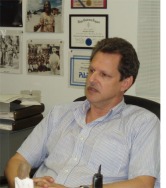
From his office at the Bikini Atoll Town Hall in Majuro, Bikini trust liaison Jack Niedenthal said most of what he sees is in people’s heads. “You get guys getting common colds and sometimes they blame it on, you know, bombs.” He also sees a victim mentality, which is a challenge in raising his own kids within the community. Many parents sit in front of the office waiting for news of compensation.
Though only some, mostly elderly, Bikinians would go back to Bikini if it were cleaned, Niedenthal said it’s an option that needs to be given to them. In the meantime, he said it’s “depressing,” seeing people who haven’t gotten their lives going. “Those that have pretty much move out,” he said.
Note, the Bikini Mayor, said many Bikinians come to his office or to his home asking him to call the bank for them, or to ask a store to lend them credit.
Some live in such Marshallese communities in the United States as Springdale, Ark., Salem Ore., Enid, Okla., or Costa Mesa, Calif. Those people have moved on with their lives, according to Niedenthal. “Some very successfully, some not so successfully and they’ve become part of the welfare culture in the U.S.”
“Again, it goes back to education,” said Kelen. “If 90 percent of people would eliminate the check [quarterly payment of $200+] and got jobs, that would be more money, he explained, hoping the trust funds could build back up to the required amount to resettle Bikini.
But jobs are a problem in the Marshall Islands, where one-third of workers are employed by the government and another third are without work. The United States provides $65 million each year in funding to the RMI government. The largest components are for health care and education.
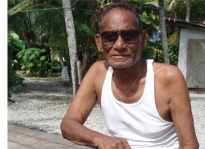
Kelen’s “papa,” Kelen Joash, a Bikini elder, said he doesn’t understand funding of Bikini through the RMI government. “We used to be kids belonging to the U.S., but now we’re adopted by the RMI government,” he said sitting across the table from his son. Joash said the U.S. hasn’t fulfilled its obligation to return the Bikinians back to their home.
“They made promises they would take care of us. We’re living on this rock. It doesn’t seem like we have a future on this island.
“We want to go home now.”
March 17, 2006 at 3:17 pm
bob
November 26, 2007 at 11:38 pm
I was searching for this kind of a blog for months now. Actually lost the hope of finding one, but here i am 🙂 Thanks for the great articles! Looking forward for a little read after dinner 🙂
April 8, 2016 at 3:54 am
Its okay to post a pic if you want. We own the copyright to all the pics. Click http://link.mx/hool081945